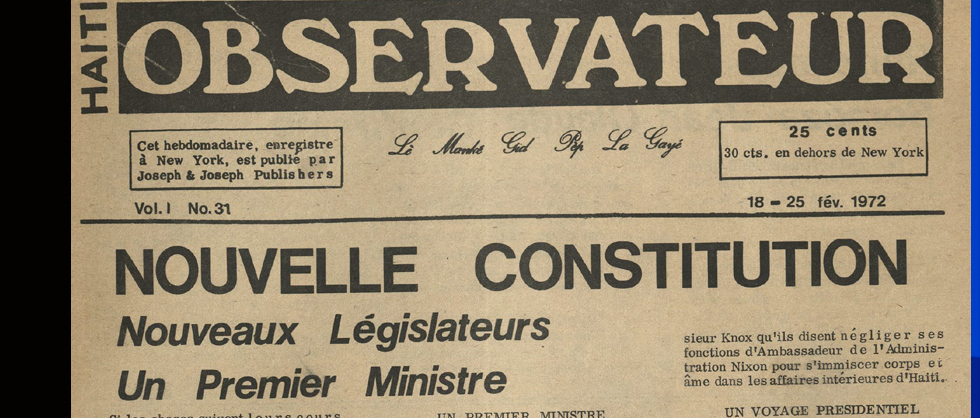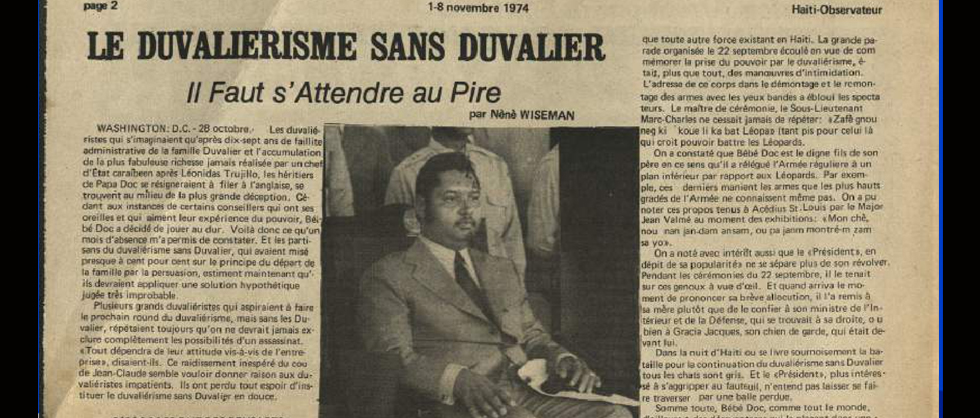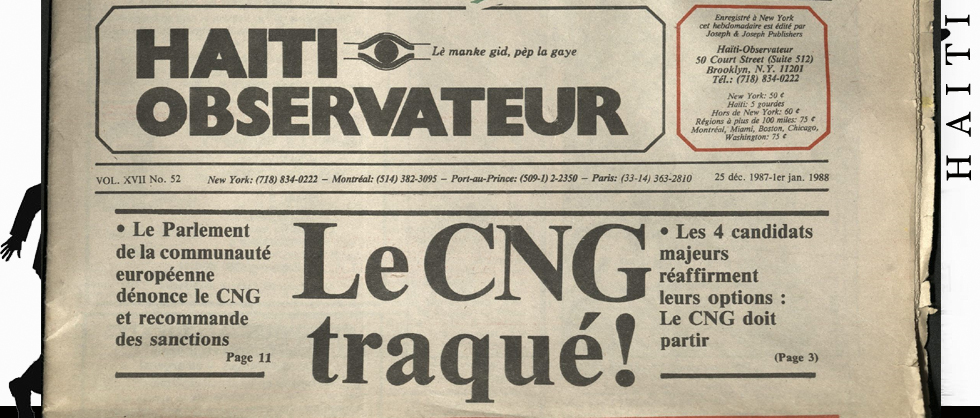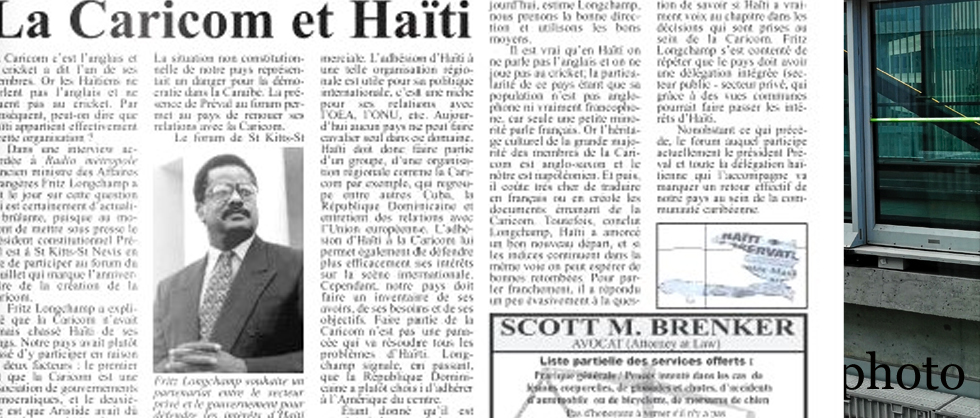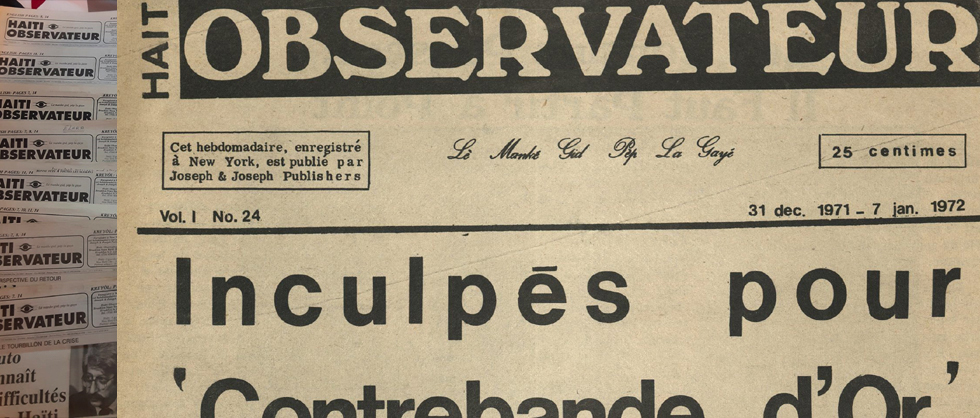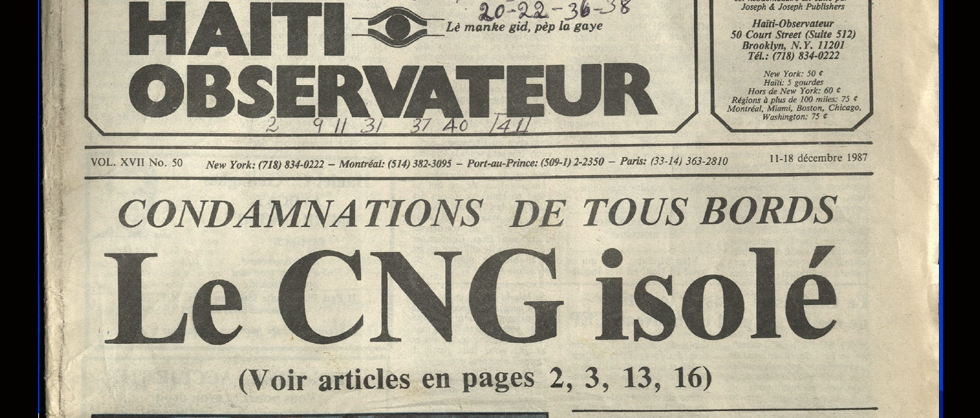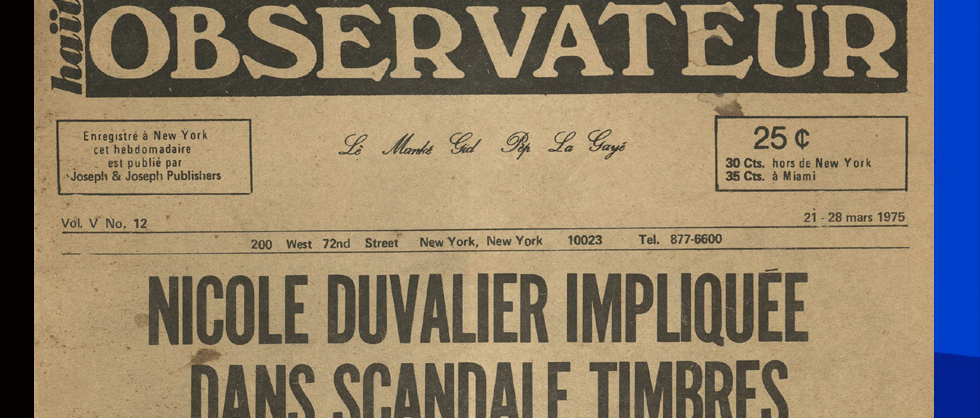Denouncing the inconsistency of the international community’s policy towards Haiti by Editor
The Haitian people have been mobilizing for more than a year to demand the resignation of Jovenel Moïse, a Head of State repudiated by the vast majority of the citizens, whether those at home or others abroad. Uniformly, the more than two or three million people who took to the streets of the capital and in other cities last year have called for his resignation. Since then, their numbers have more than tripled and, in the last four weeks, almost the entire nation has turned the page on him. However, the international community, led by the United States, continues to support the Moïse presidency, an inconsistent policy dictated by unusual reasons. Fortunately, the leaders of the mobilization have not relented, despite blatant blackmail by some foreign diplomats.
Indeed, in response to the argument that Jovenel Moïse can’t be removed before his mandate ends in 2022, the people have pronounced his dismissal without appeal, paying no attention to those diplomats of the CORE Group who advocate that “democratically elected, his term of office should only end with new elections.“ Faced with those sectors of the international community ignoring their grievances, Haitians have deployed a final show of force to convince Moïse’s foreign supporters that his “immediate and unconditional resignation” can’t be negotiated.
Haitians are really baffled by the attitude of those whose various States are considered “models of democracy.” As if the latter have forgotten the essence of democracy by the people and for the people. Moreover, Haitian citizens are the more confused by the behavior of those diplomats who represent countries dubbed “friends of Haiti,” that voted to enroll Haiti in the school of democracy under the supervision of the United Nations. There’s good reason to wonder about the hypocrisy displayed by the democracy lecturers! It’s not far-fetched to believe that some ulterior motives dictate the policies of those countries regarding their blind support for Jovenel Moïse. Understandably, Haitian pro-democracy sectors, especially the young, are disappointed by the action―and inaction―of those who, through their speeches, had convinced them of their democratic ideals.
As it is, under successive Haitian regimes since the fall of the Duvalier dynasty in 1986, whether under Aristide, Préval, Martelly or Moïse now, the diplomats posted in Haiti have touted the value of “dialogue,” always insisting that the democratic opposition follow that principle in dealing with the government. Considering the villainy displayed by those in power, the incoherence in the attitude of the diplomats has reached a scandalous level.
It’s well known that members of the diplomatic missions travel throughout the country and are fully aware about what’s going on in Haiti. There’s no way for them to convince us that they don’t know the twists and turns of the numerous scandals in which President Jovenel Moïse is involved. They can’t say they don’t know that Moïse was sworn into office while under indictment for money laundering; that he’s been targeted in the embezzlement of the $4.2 billion PetroCaribe Fund, as reported by the Superior Court of Auditors and Administrative Disputes (CSC/CA). Then, there are the massacres of La Saline where more than 70 people, including women and small children, were shot dead or chopped up with machetes and their bodies dumped on piles of garbage. There’s evidence that senior officials close to the presidency were involved in the La Saline killings, as well as in those in other slums of Port-au-Prince, such as in Carrefour-Feuilles or Cité Soleil. Moreover, the United Nations Com- mission on Human Rights issued a report denouncing these crimes, calling on the authorities to launch an investigation into these crimes to identify and punish their perpetrators.
Besides the killings mentioned above, on November 13, 2018, there was a massacre in the Grande Ravi- ne slum south of the capital, when eight civilians were executed in revenge for two police officers who were killed in a clash with members of an armed gang. Taking stock of the bloody crimes committed under the presidency of Jovenel Moïse, there’s no ignoring the people who have been killed or injured in recent days during the general mobilization to demand the president’s departure. The social networks have displayed the bodies of young men killed or wounded, piled up like sacks of flour in an open pick-up truck. Human rights organizations have denounced these crimes, indicating that since the mobilization began in the last four weeks, Jovenel Moïse’s mercenary police officers have killed, in average, a dozen people a day across the country.
Certainly, these crimes and scandals, blared in headlines in the local press, are known by the diplomats, who are generally well informed about what is happening in the country. After all, MINUJUSTH, the United Nations agency deployed in the Haiti, supposedly is there in sup- port of justice in Haiti. While its mandate is scheduled to end this month, the American Helen La Lime, who heads it, acting as the UN Secretary-General’s Special Representative, can’t feign ignorance about the crimes committed under the “Bald-Headed” regime led by Jovenel Moïse. Was it not under her direction that investigation was conducted in the massacres of La Saline, Carrefour-Feuilles and others recorded elsewhere in the Haitian capital? Isn’t it true that when the UN Commission on Human Rights denounced those massacres, it also recommended that the perpetrators be identified and duly prosecuted? How can Michelle Sisson, the U.S. ambassador to Port-au-Prince, claim to ignore these facts when she had a long meeting with leaders of Haitian human rights organizations who informed her about the crimes ? Wasn’t she photographed at the Embassy in the company of Pierre Espérance of the Haitian Network for the Defense of Human Rights (French acronym RNDDH) as an indication of support for their work ?
Considering the foregoing, one must question the reasons for not reporting in detail to her superiors the dire situation in Haiti. During a meeting last week, in Miami, of Congresswoman Nancy Pelosi, Speaker of the House of Representatives, with Frederica Wilson, her colleague from Florida, the question was raised about the ignorance of these facts by the American Congress. Why did the American Embassy in Port-au-Prince keep silent about those crimes ? If appropriate reports were made to the State Department, why did it choose to withhold the information from Congress ?
Undoubtedly, there is a radical change in current American diplomacy regarding mammoth demonstrations by Haitian citizens denouncing violations of their rights by a corrupt and criminal puppet president, who is deeply involved in the squandering of public funds. We’ll point out that under President Ronald Reagan, in 1985-86. when Jean-Claude Duvalier’s regime un- leashed his hordes of killers against demonstrators, the White House, through the State Department, had dissociated itself from that government. Similarly, in 2004, when tens of thousands of citizens took to the streets to demand that Jean-Bertrand Aristide resign, the American government had instructed its ambassador to reach an agreement with other colleagues in the Diplomatic Corps to encourage the Haitian president to resign in order to “avoid a blood- bath.”
It seems that the PetroCaribe pro- gram, introduced in Haiti in 2008, has created a new generation of politicians whose objective is not to serve the Haitian people, but to enrich themselves quickly at the expense of public resources. Moreover, they are determined to remain in power to ensure impunity for themselves and their associates. The Venezuelan petrodollars have not only been used to create a new crop of millionaires among the men and women in power, but they also have used their newfound wealth to attract corrupt supporters at the international level. In that context, they have succeeded in contaminating even those who should be beyond suspicion or reproach.
In that light the silence of the diplomats of the CORE Group, in the face of the abuses of the Haitian regime is troubling. How can they close their eyes to the monstrosities herein mentioned? And how can they continue in their unconditional support of Jovenel Moïse? Would it be that they too may be participants in the PetroCaribe “feast?” In fact, persistent rumors attribute such serious offenses to representatives of foreign countries who have cozied up to Haitian Presidents and Prime Ministers. Based on all the facts, there is no other explanation to the inconsistency displayed by the international community’s policy towards Haiti, a behavior unbecoming of diplomats. There’s no secret that won’t be revealed, say the Scriptures. In such case, one hopes that the concerned diplomats will explain to everyone’s satisfaction the reasons for their excesses!
cet article est publié par l’hebdomadaire Haïti-Observateur, édition du 9 octobre 2019 Vol. XXXXIX no.40, et se trouve en P.11 à : http://haiti-observateur.info/wp-content/uploads/2019/10/H-O-9-octob-2019.pdf


